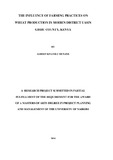| dc.description.abstract | Farmers face many challenges in their farming practices which may arise from
climatic conditions, pest and diseases and other environmental factors. The risk
management practices include diversification and social mechanisms for coping with
risk among large scale wheat farmers in Moiben District Uasin Gishu County. This
study was guided by the following objectives; to identify the major types of risks that
face large scale wheat farmers; to find out the agricultural practices by large scale
wheat farmers on production; to establish the impact of farm equipment’s and
machinery on wheat production; to find out the challenges of controlling pests and
other wheat diseases .The study adopted a cross sectional quantitative and qualitative
research design approach, where the cases under study were described as phenomenon
in the real-life context in which they occurred. The study explored the existing
principles and practices pertaining to the impact of risk management farming
practices on wheat production in the light of the framework provided by Epstein’s
model. The study targeted, all the large scale farmers in Moiben District with over 20
acres of land under cultivation of wheat, 74 farmers were identified (Ministry of
Agriculture, Uasin Gishu County 2013). 20 famers were sampled four from each of
the five administrative units in Moiben district, for purposes of interview schedules,
focus group discussion, and questionnaires this was done purposively; one
agricultural officer from each of the five administrative units was also sampled. The
study was undertaken between the months of June to July, 2013. It adopted the use of
questionnaires, interview guides, focus group discussions as the primary collection
tools. The analysis adopted quantitative and qualitative design in order to achieve the
objectives of the study. Content analysis was used as the main method of data analysis
qualitatively. While, quantitative data was analyzed and interpreted using descriptive
statistical techniques. The data in this study consisted mainly of questioners,
individual interview transcripts, focus group discussion and observations. The
findings of the study established that along with investments and policy options to
increase and diversify income sources both within and outside agriculture, policy
support is required for building local capacity, establishing institutions that enhance
access to information, seeds and services, insurance mechanisms to buffer
production risks, and safety nets that help resilience and recovery from climate induced
shocks. The study recommends that Agricultural Finance Corporation (AFC)
and other institutions should introduce insurance schemes to caution farmers against
risks. The study further recommends that the government through the ministry of
agriculture should control the supply of counterfeit seeds | en_US |

